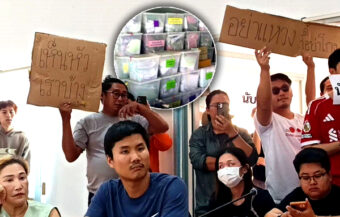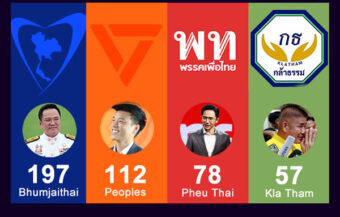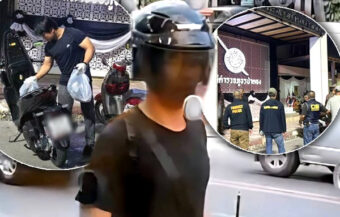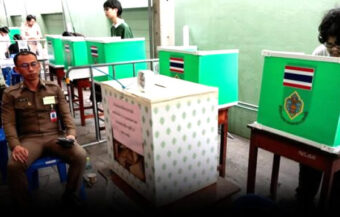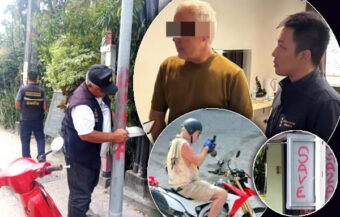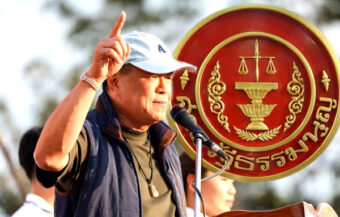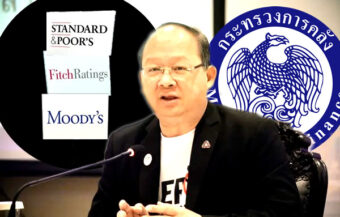PM promises clarity on alcohol law as Thailand’s tourism and hospitality sectors reel in chaos. Businesses demand repeal or non-enforcement after new rules spark confusion, fears of strict fines and operational disruptions for local and foreign drinkers alike.
Prime Minister Anutin Charnvirakul has ordered clarifications on the alcohol control law that has thrown the hospitality industry into chaos since it came into effect on Saturday, November 8. Committees begin meeting on Thursday, with decisions expected by December 4. Meanwhile, business leaders are demanding bold action. Many call for the law to be repealed or ignored entirely, allowing all establishments to sell alcohol freely, without fear of enforcement. The rollout is widely seen as a governance failure and a debacle, undercutting the government’s earlier promises of alcohol liberalisation.

Prime Minister Anutin Charnvirakul has ordered the Ministry of Public Health and the Ministry of Tourism and Sports to respond immediately to the Alcoholic Beverage Control Act crisis. The law came into effect on November 8, 2025. Reports from tourist hotspots across Thailand indicate severe impacts on the hospitality sector. Accordingly, the Prime Minister demanded clarifications from the ministries. Meanwhile, trade sources have requested the removal of all prohibitions, citing potential bureaucratic complications.
On November 11, 2025, at 11:50 a.m., Mr. Siripong Angkasakulkiat, spokesman for the Prime Minister’s Office, announced Cabinet decisions at Government House. The Prime Minister, also Minister of the Interior, raised concerns about complaints regarding the law’s enforcement. Ministries were instructed to clarify the Act urgently.
They must explain where and when alcohol sales are prohibited. They are also tasked with guiding public understanding among business operators and tourists. Public relations campaigns were emphasised to ensure correct implementation. The Prime Minister expects clarification by December 4, 2025.
Prime Minister orders ministries to clarify alcohol law amid complaints and business disruptions nationwide
The Alcoholic Beverage Control Act does not specify prohibited hours. However, a Prime Minister’s Office announcement, signed June 3, limits alcohol sales from 11:00 a.m. to 2:00 p.m. and 5:00 p.m. to midnight. Exceptions include passenger terminals at airports serving international flights, service establishments operating normal hours, and hotels. Restaurants may not sell or allow alcohol consumption outside of 2:00 p.m. to 5:00 p.m.
Mr. Siripong warned that tourists unfamiliar with Thai regulations could be confused. Therefore, a committee will meet on November 13 to resolve issues. Resolution is expected by December 4. Meanwhile, confusion among citizens and business operators continues.
Eight tourism and hospitality associations petitioned the Prime Minister on November 12 to revoke alcohol sale and consumption time restrictions. Associations reported negative effects on tourism and service sectors.
Sanga Ruangwattanakul, President of the Khaosan Business Association, said the new law has disrupted business operations. He noted that citizens and tourists face confusion over the Act’s provisions. The law maintains traditional bans between 2:00 p.m. and 5:00 p.m., and after midnight. It also introduces fines up to ฿10,000 for consumption violations, including foreign tourists.
Associations warn alcohol rules with fines and time bans create confusion and harm tourism operations
Sanga said restrictions disrupt nightlife and tourism. He added that these rules contradict government efforts to revive tourism. Associations support responsible alcohol consumption. However, they argue that existing restrictions fail to reduce harm. They warn that the law encourages underground markets and illicit trade.
The associations proposed three urgent actions. First, they requested lifting sales and consumption bans between 2:00 p.m. and 5:00 p.m., and after midnight. They said this would reduce business losses and illegal alcohol trade.
Second, they urged reviewing alcohol sales zoning, particularly in major tourist provinces and designated tourism zones. The goal is to allow restaurants and entertainment venues to operate legally. Third, they asked the government to revoke the online alcohol sales ban. Associations recommended regulated online sales with age verification at purchase and delivery. This, they said, would support local craft producers and OTOP businesses.
The amended legislation imposes fines on individuals consuming alcohol outside permitted hours. Section 32 requires those placing last orders before 2:00 p.m. to finish drinks within five minutes. Failure results in a fine of up to ฿10,000. This is the first time individual consumers, including tourists, are directly penalised. Previously, fines applied only to sellers.
New law imposes fines on individuals and challenges restaurants and tourist venues with strict rules
The Thai Restaurant Association warned that businesses already facing economic slowdowns would be affected. MP Taopiphop Limjittrakorn from the opposition People’s Party said tourists could be confused by timing rules.
He cited cases where drinks ordered before 2:00 p.m. must be consumed immediately. Advertising rules in the law are also complex, making compliance difficult.
Critics say fines are disproportionate. Health officials confirmed enforcement discretion rests with local authorities. Questions arise about consistency and possible corruption. Some observers note opportunities for bribery could emerge under strict individual enforcement.
The original 1972 legislation remains largely unchanged. It bans alcohol sales between 2:00 p.m. and 5:00 p.m., and from midnight to 11:00 a.m. at retail outlets, supermarkets, and food shops. Full-day bans apply on Makha Bucha, Visakha Bucha, Lent, and the end of Lent. Exemptions include international airports, licensed entertainment venues, hotels, select tourist outlets, and wholesale traders.
Critics highlight the outdated alcohol law with complex rules and the risk of inconsistent enforcement
Strict alcohol control advocates cite drink-driving fatalities to justify the law. Road deaths remain high, exceeding 10,200 so far in 2025. Critics argue that selective enforcement against drink-driving would be more effective. Social drinkers not operating vehicles are subject to unnecessary restrictions.
Enforcement of the amended Act raises practical questions. Authorities must monitor individual compliance in restaurants and bars. Observers say the law’s detail complicates enforcement. Tourist-heavy venues face particular challenges.
Industry associations emphasise that clear rules are essential for the smooth operation of business concerns. Petitions note that unclear regulations may result in penalties for tourists and local consumers alike.
The Prime Minister has tasked ministries with explaining permitted and prohibited actions. Guidance is to be accessible for domestic and international audiences. Public relations campaigns are planned to mitigate confusion. Cabinet priorities focus on clarification and outreach.
Enforcement fears and detailed regulations prompt calls for clear guidance and consistent rules nationwide
Clarification deadlines are set for December 4. Committees will meet to address conflicts between current law and operational realities. Ministries will review sales hours, consumption bans, zoning regulations, online sales, and penalty structures.
Opposition lawmakers argue that individual penalties could deter tourism. Minor infractions may trigger fines up to ฿10,000. Enforcement discretion adds uncertainty. Hospitality groups report revenue loss during restricted hours. Nightlife venues and restaurants serving tourists report disruptions. Peak tourist season amplifies economic consequences.
The online alcohol sales ban also drew criticism. Associations argue it conflicts with the digital economy policy. They propose regulated online sales with mandatory age verification. Officials are reviewing methods to balance regulatory compliance and business opportunities.
The Prime Minister’s Office said legal clarifications will specify sales hours, prohibited actions and exceptions. Enforcement procedures will be outlined for local authorities. Officials aim for uniform implementation across all provinces.
Order to clarify sales, zones, exemptions and penalties as enforcement and compliance concerns grow
Public safety remains the official justification for restrictions. Officials cite traffic fatalities linked to alcohol consumption. Critics argue that targeted enforcement against drink-driving would be more effective than blanket bans. The present law restricts all consumers equally, regardless of risk factors.
The Alcoholic Beverage Control Act maintains a regulatory framework that is over 50 years old. Long-standing provisions regulate retail sales and set consumption limits. Recent amendments introduce penalties for individual consumers and expand prohibited behaviours.
Tourism authorities warn that unclear rules may affect Thailand’s image. Confusion over sales and consumption hours could reduce tourist satisfaction. Associations emphasise that predictable and enforceable regulations are crucial.
Local business feedback highlights compliance challenges. Restaurants struggle to inform customers about restrictions. Staff training, signage and guidance for foreign visitors add operational burdens.
Unclear alcohol rules and complex enforcement risk harming Thailand’s tourism reputation abroad
Committees reviewing the law are scheduled to meet before the end of November. Clarifications are expected from the Prime Minister’s Office by December 4. Enforcement and public understanding are priorities.
Operators note that removing or adjusting restrictions could support tourism and local economies. Aligning sales hours with operational realities is recommended. Hotels, restaurants and entertainment venues require predictable regulation.
Exceptions exist for international airports, licensed hotels, and designated tourism establishments. Businesses outside these categories face stricter restrictions. Associations argue this creates uneven treatment.
Government officials say the law’s purpose is public safety. Ministries must balance enforcement with clear guidance. Citizens, tourists, and business operators must be informed. Public communications are to reduce misunderstanding.
Review of alcohol law ongoing with focus on enforcement clarity and practical guidance for all stakeholders
The law’s consumption rules are unprecedented. Consumers must finish drinks within minutes of the cutoff times. Critics argue that fines are potentially arbitrary. There are fears of abuse and corruption targeting drinkers. Lawmakers and industry groups continue to call not just for clarification but for reduced regulation of the sector. They say it is crucial to boost foreign tourism. Previously, this has been shown to be true.
Cabinet monitoring of the issue continues. Ministries are coordinating with industry associations. Clarifications on sales hours, consumption, exemptions, and penalties will be published.
Tourism operators emphasise the economic importance of clarity. Confusion could affect sales, employment, and Thailand’s reputation. Associations argue that practical rules support tourism growth and local enterprise.
The Prime Minister’s Office reaffirmed the urgency of clarification. Ministries must prevent confusion and ensure uniform enforcement. Guidance is to be accessible to everyone. However, even now, the nature of the law may simply be too cumbersome. Certainly, it has proved to be a deterrent to customers, both local and tourist alike. Indeed, this downturn has impacted all kinds of establishments everywhere in the country since last Saturday.
Consumption rules and enforcement complexity continue to disrupt businesses and deter customers
The Act, of course, still remains fully in force during review. Authorities will enforce existing restrictions until clarifications are issued. Ministries are expected to provide direction for businesses, tourists, and law enforcement.
Public communications will accompany official clarifications. Ministries are responsible for notices, informational materials, and media engagement. The goal is a clear understanding among domestic and international audiences.
Observers note that successful implementation may not be possible. Even with amendments or a walk back to bring back traffic, it will now depend on clear communication, uniform enforcement, and practical guidance. Ministries are tasked with addressing ambiguity and preventing the confusion that has already been sown. At the same time, there is a real fear that this will simply not be possible. The situation is undeniably catastrophic for small business owners involved.
Tourism and hospitality associations continue to advocate for radical adjustment. They argue that a balance between regulation and operational flexibility is essential. Industry feedback may influence revisions or official guidance.
Ministries must resolve ambiguity as alcohol control continues to impact small business and tourism
In short, the business sector wants the alcohol control removed altogether for all establishments and in all areas to avoid confusion. They argue that the restrictions can subsequently be introduced for particular areas of the country by local authorities. Basically, the reverse approach of what this law envisaged, but which officials still failed to implement.
The government’s review is ongoing. Committees will meet in late November, and clarifications from the Prime Minister’s Office are expected by December 4. Meanwhile, enforcement and public comprehension remain priorities.
The law’s impact highlights challenges of detailed regulation. Businesses, tourists, and lawmakers are closely monitoring outcomes. However, ministries face pressure to provide timely guidance.
Thailand’s tourism industry remains a key focus for policymakers. Alcohol control rules are reviewed in the context of safety, economics, as well as international perception. In addition, the new law has created instability and fear.
The penalties are draconian, while the new requirements imposed on drinkers, including foreign tourists, are simply unreasonable. Certainly, this is true in the context of foreign holiday-making.
Business calls for repeal as alcohol law instability creates fear and confusion for tourists and operators
The debacle is a reminder of the difficulties during the Covid-19 crisis era from 2020 to 2023, when government regulations regularly proved too burdensome and impractical. Afterwards, the industry has never fully recovered.
Ministries of Public Health and Tourism will continue coordinating with industry associations. Meanwhile, clarifications will cover sales hours, consumption rules, exemptions and penalties.
The Prime Minister emphasised urgent action. Ministries must prevent confusion, ensure enforcement, and provide clear guidance. Therefore, tourism, business, as well as public understanding are key considerations.
Alcohol control law review as ministries coordinate with industry to clarify rules and penalties
The Alcoholic Beverage Control Act remains under review. Enforcement continues according to current rules. Clarifications are aimed at resolving ambiguity and guiding businesses, tourists, and authorities.
However, the problem is that many industry sources believe the controls and regulations are simply too complicated. Indeed, they rely on the differentiation of different types of outlets. In addition, the bill provides for diverse zones as well as secondary regulations to be drawn up.
Alcohol law debacle continues to decimate not only tourism industry but also wider grassroots economy
Alcohol law shoots foreign tourism in foot for High Season with stiff fines for visitors drinking up at watering holes
Previously, People’s Party MPs had questioned these ambiguities and glaring omissions but were told that substantive regulations would clarify the matter. That never happened.
The business sector is calling simply for the withdrawal of the measure or its non-enforcement by authorities. At this time, there is chaos and confusion. Sales are being lost, which will not be regained without a decisive response.
Join the Thai News forum, follow Thai Examiner on Facebook here
Receive all our stories as they come out on Telegram here
Follow Thai Examiner here
Further reading:
Closure of Phuket bars and alcohol restrictions turn off prospective foreign tourists says survey
Blow for travellers: strict rules, no bars and entertainment venues allowed to open in Phuket


